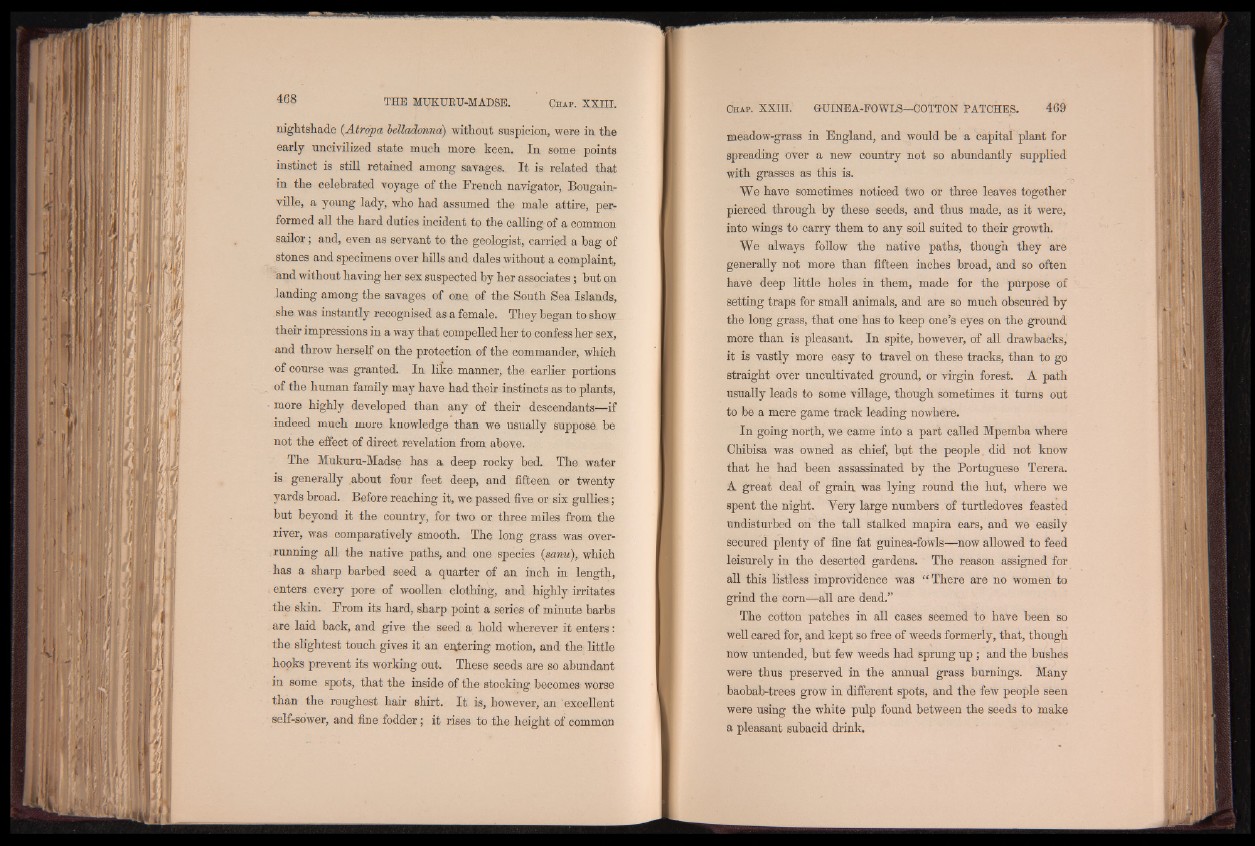
nightshade (.Atropa belladonna) without suspicion, were in the
early uncivilized state much more keen. In, some points
instinct is still retained among savages. I t is related that
in the celebrated voyage of the French navigator, Bougainville,
a young lady, who had assumed the male attire, performed
all the hard duties incident to the calling; of a common
sailor; and, even as servant to the geologist, carried a hag of
stones and specimens over hills and dales without a complaint,
and without having her sex suspected by her associates; hut on
landing among the savages of one of the South Sea Islands,
she was instantly recognised as a female. They began to show
their impressions in a way that compelled her to confess her sex,
and throw herself on the protection of the commander, which
of course was granted. In like manner; the earlier portions
of the human family may have had their instincts as to plants,
■ more highly developed than any of their descendants—if
indeed much more knowledge than we usually suppose be
not the effect of direct revelation from above.
The Mukuru-Madse has a deep rocky bed. The water
is generally about four feet deep, and fifteen or twenty
yards broad. Before reaching it, we passed five or six gullies;;
but beyond it the country, for two or three miles from the
river, was comparatively smooth. The long grass was overrunning
all the native paths, and one species (sanu), which
has a sharp barbed seed a quarter of an inch in length,
< enters every pore of woollen clothing, and highly irritates
the skin. From its hard, sharp point a series of minute barbs
are laid back, and give the seed a hold wherever it enters:
the slightest touch gives it an entering motion, and the little
hooks prevent its working out. These seeds are so abundant
in some spots, that the inside of the stocking becomes worse
than the roughest hair shirt. I t is, however, an excellent
self-sower, and fine fodder; it rises to the height of common
meadow-grass in England, and would be a capital plant for
spreading over a new country not so abundantly supplied
with grasses as this is.
We have sometimes noticed two or three leaves together
pierced through by these seeds, and thus made, as it were,
into wings to carry them to any soil suited to their growth.
We always follow the native paths, though they are
generally not more than fifteen inches broad, and so often
have deep little holes in them, made for the purpose of
Setting traps for small animals, and are so much obscured by
the long grass, that one has to beep one’s eyes on the ground
more than is pleasant. In spite, however, of all drawbacks,'
it is vastly more easy to travel on these tracks, than to go
Straight over uncultivated ground, or virgin forest. A path
usually leads to some village, though sometimes it turns out
to be a mere game track leading nowhere.
In going north, we came into a part called Mpemba where
Chibisa was owned as chief, but the people, did not know
that he had been assassinated by the Portuguese Terera.
A great deal of grain, was lying round the hut, where we
spent the night. Very large numbers of turtledoves feasted
undisturbed on the tall stalked mapira ears, and we easily
secured plenty of fine fat guinea-fowls—now allowed to feed
leisurely in the deserted gardens. The reason assigned for
all this listless improvidence was “ There are no women to
grind the corn—all are dead.”
The cotton patches in all cases seemed to have been so
well cared for, and kept so free of weeds formerly, that, though
now untended, but few weeds had sprung up ; and the bushes
were thus preserved in the annual grass burnings. Many
baobab-trees grow in different spots, and the few people seen
were using the white pulp found between the seeds to make
a pleasant subacid drink.